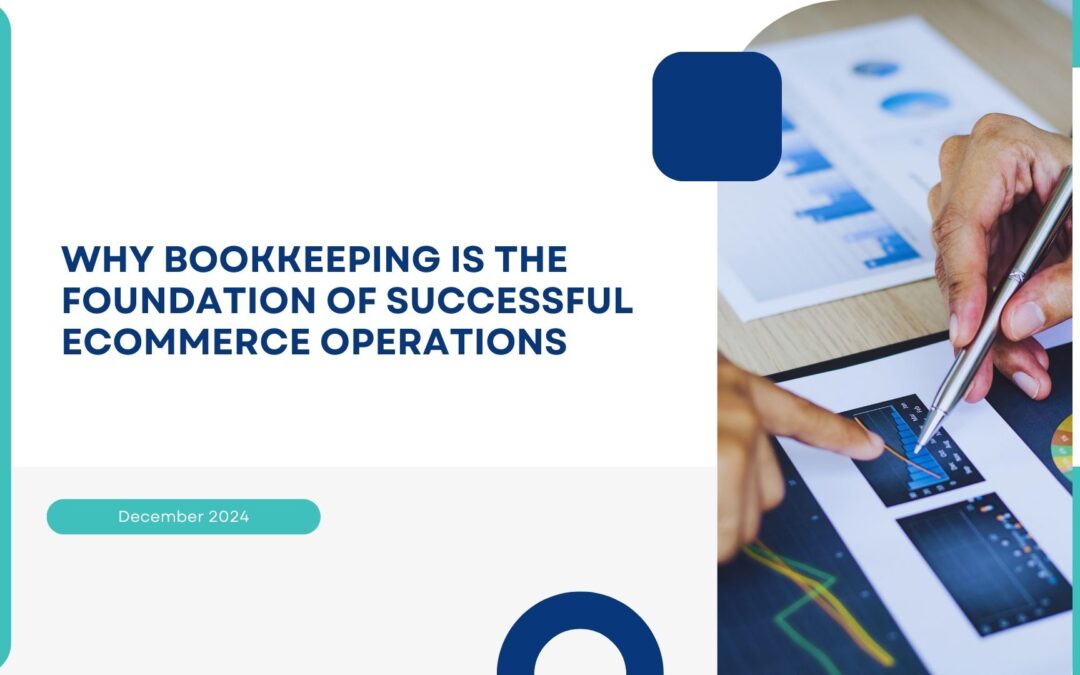Why Bookkeeping is the Foundation of Successful Ecommerce Operations
Success in the quick-paced world of e-commerce depends on more than simply creative goods and advertising tactics. Financial management, particularly e-commerce bookkeeping, is the foundation of any successful e-commerce business. In addition to guaranteeing compliance, accurate bookkeeping gives companies the information they need to scale successfully, control expenses, and make wise decisions. With useful insights and workable answers, this article examines why bookkeeping is the foundation of prosperous e-commerce enterprises.
The Role of Bookkeeping in Ecommerce Operations
At its core, ecommerce accounting involves recording, analyzing, and managing financial transactions related to online sales. Unlike traditional bookkeeping, ecommerce bookkeeping must address unique challenges such as managing inventory costs, handling multiple payment gateways, and tracking global transactions. Here’s why bookkeeping is indispensable:
1. Clarity of finances
Bookkeeping offers a thorough picture of the financial well-being of the company. This transparency is crucial for e-commerce merchants who must balance a number of costs, including platform fees, shipping, and marketing.
2. Compliance with Taxes
Since e-commerce companies frequently operate in multiple locations, adhering to tax laws can be challenging. Precise bookkeeping guarantees timely submissions, preventing fines and preserving reputation.
3. Management of Cash Flow
Planning for expansion and covering operating expenses depend on effective cash flow management. Businesses can stay viable by keeping an eye on their revenue and expenses with the aid of bookkeeping.
4. Making Well-Informed Decisions
Business owners may find successful goods, optimize spending, and make strategic investments when they have access to precise financial data.
Why Bookkeeping is Crucial for Ecommerce Growth
1. Understanding Profit Margins
Calculating profit margins is one of the biggest problems e-commerce companies have. From production to distribution, there are many costs involved. Bookkeeping makes sure all of these are covered, providing a clear picture of profitability.
2. Scaling Operations
The intricacy of e-commerce companies’ financing increases with their size. Bookkeeping ensures scalability without financial mismanagement by offering the structure required to handle higher transaction volumes.
3. Strengthening Investor Confidence
Maintaining accurate financial records is crucial for companies looking to raise capital from outside sources. Accurate financial statements are essential for lenders and investors to assess a company’s stability and future prospects.
4. Identifying Cost-Saving Opportunities
Regular bookkeeping can reveal areas where costs can be cut without compromising on quality or customer satisfaction, improving overall efficiency.
Challenges of Ecommerce Bookkeeping and How to Overcome Them
While bookkeeping is crucial, ecommerce businesses face unique challenges:
1. Managing Inventory Costs
Tracking inventory across multiple platforms can be overwhelming. Bookkeeping tools integrated with inventory management systems can simplify this process.
2. Handling Multiple Payment Gateways
Ecommerce businesses often use multiple payment processors, which can complicate bookkeeping. Consolidating records through accounting software can help maintain accuracy.
3. Dealing with Global Transactions
Selling internationally involves currency conversions and varying tax regulations. Partnering with experts like Ceptrum ensures compliance and simplifies these complexities.
Ceptrum: A Trusted Partner in Ecommerce Bookkeeping
Ceptrum is a notable brand in the field of e-commerce bookkeeping. Ceptrum is well-known for its proficiency in e-commerce accounting and provides customized solutions to assist companies in streamlining their financial processes.
Why Choose Ceptrum?
- Specialized Expertise: With a focus on ecommerce businesses, Ceptrum understands the unique challenges of the industry.
- Advanced Tools: The company leverages cutting-edge technology to provide accurate and timely bookkeeping services.
- Comprehensive Services: From tax compliance to inventory management, Ceptrum covers all aspects of bookkeeping.
By partnering with Ceptrum, ecommerce businesses can focus on growth while ensuring their financial foundation is strong and reliable.
How to Optimize Bookkeeping for Ecommerce Success
1. Make Use of Trustworthy Software
Purchase accounting software designed specifically for e-commerce, like as Xero or QuickBooks, or expert-recommended tools like Ceptrum.
2. Make Regular Reconciliations
To prevent inconsistencies, make sure your bank statements and accounts match.
3. Pay Attention to KPIs
To make data-driven decisions, keep an eye on important performance metrics such as return rates, average order value, and gross profit margin.
4. Automate Where Possible
Automation reduces errors and saves time, allowing businesses to focus on strategic growth.
5. Hire Professionals
For businesses lacking in-house expertise, working with trusted bookkeeping services like Ceptrum can make a significant difference.
Conclusion
Successful e-commerce companies are built on bookkeeping, which is more than simply a legal necessity. Businesses may assure compliance, obtain clarity, and make growth-promoting decisions by keeping precise financial records. Strong bookkeeping procedures will be essential to remaining ahead of the competition as the e-commerce market grows more competitive.
Companies like Ceptrum provide the resources and know-how required to handle the intricacies of e-commerce accounting for companies seeking professional assistance. Give your bookkeeping top priority, and you’ll see your e-commerce firm flourish.
FAQs
1. Why is bookkeeping important for ecommerce businesses?
Bookkeeping ensures financial clarity, compliance, and better decision-making, all of which are essential for running a successful ecommerce business.
2. What are the challenges of ecommerce bookkeeping?
Challenges include managing inventory costs, handling multiple payment gateways, and complying with global tax regulations.
3. How does Ceptrum help ecommerce businesses?
Ceptrum provides specialized bookkeeping and accounting services tailored to the unique needs of ecommerce businesses, ensuring accuracy and compliance.
4. Can I handle ecommerce bookkeeping on my own?
While possible, hiring professionals or using advanced accounting tools is often more effective, especially as the business grows.
5. What tools are recommended for ecommerce bookkeeping?
Tools like QuickBooks, Xero, and other ecommerce-specific accounting software can simplify bookkeeping processes.
